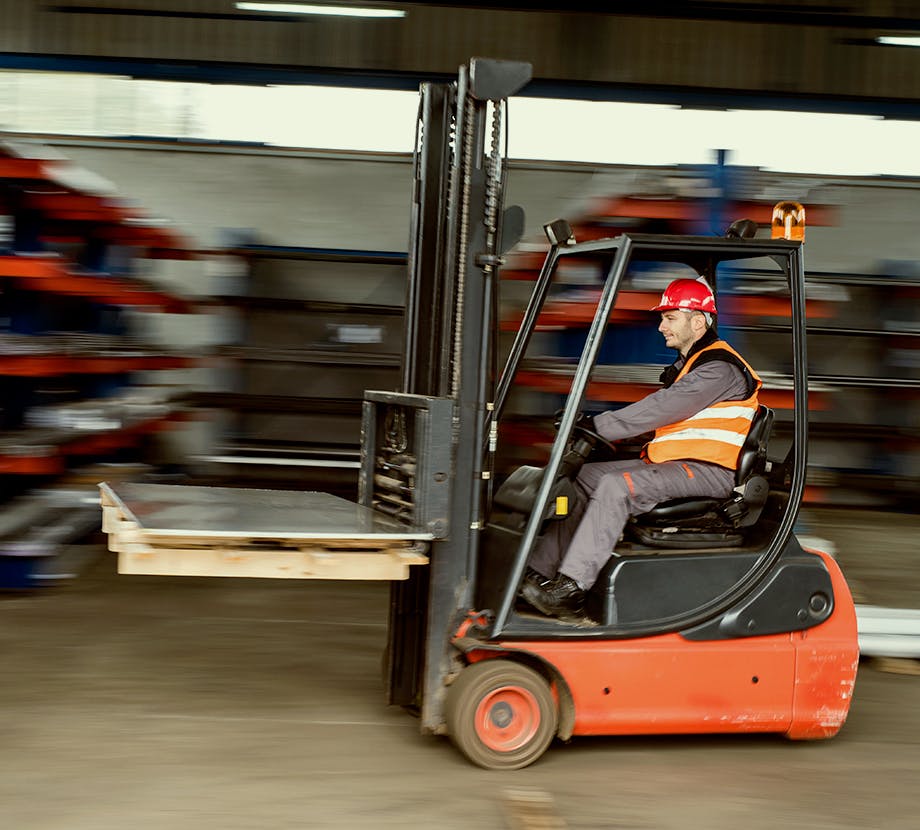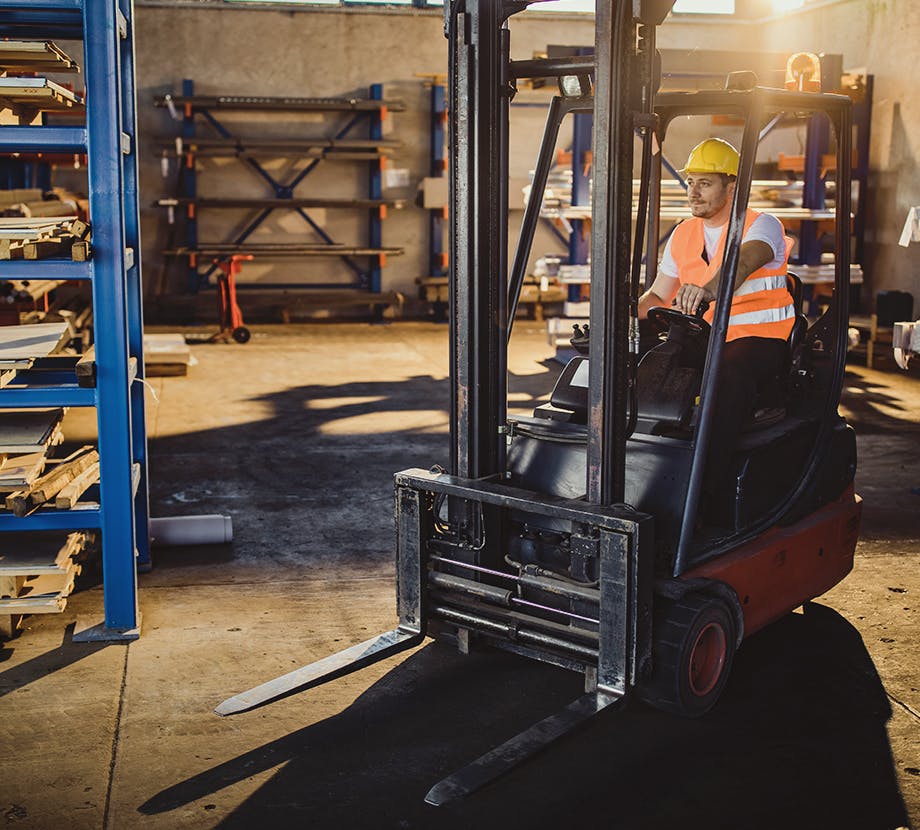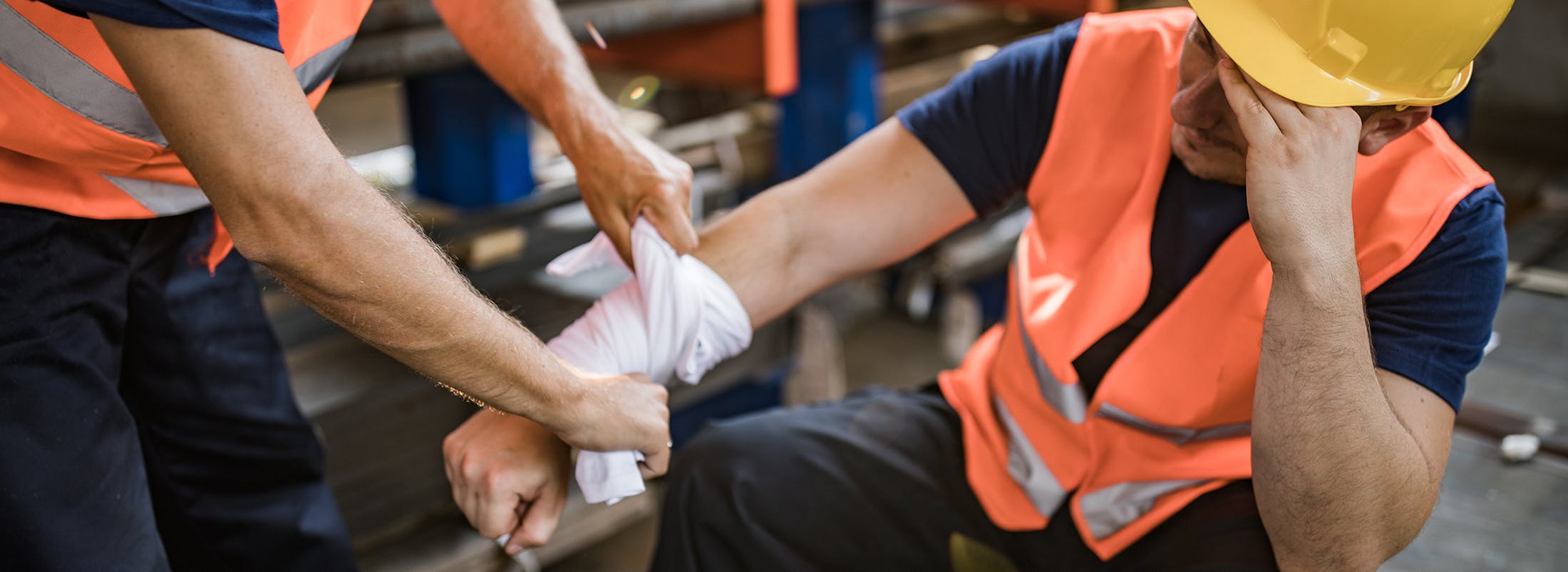His clients call Michael Lamonsoff “The Bull” because he never stops fighting for them. Thanks to “The Bull” and his team of top-rated litigators, the Law Offices of Michael S. Lamonsoff, PLLC., is consistently rated as one of the top personal injury law firms in New York City.
If you work in construction, a warehouse, or manufacturing facility, you are likely familiar with forklifts. Forklifts also known as lift trucks or powered industrial trucks, help speed up the movement of large materials, and allow for the easy transport of heavy items. Although operating a forklift is a job reserved for trained operators, accidents can happen, often with serious results.
If you’ve been injured in a forklift accident, you should consult the forklift accident lawyers in New York at the Law Offices of Michael S. Lamonsoff, PLLC right away. We know what it takes to fight the insurance companies and win, and our construction accident lawyers will fight relentlessly to get you the compensation you deserve for your injuries.

Select Results From Recent Construction Accident Cases:
- $1,000,000 settlement for a NYPD traffic officer whose vehicle was struck by a negligently operated forklift resulting in serious injuries.
- $2,200,000 awarded to a construction worker who was catastrophically injured when a trailer rolled back and crushed him against a jersey barrier.
- $2,100,000 million settlement for a construction worker injured by heavy equipment.
What Are the Most Common Causes of Forklift Accidents?
Construction workers are most commonly injured when forklifts overturn when a worker is struck, crushed, or pinned, and when someone falls off of them. These accidents occur for a variety of reasons. These are some of the most common causes:
- Lack of adequate employee training
- Improper maintenance of forklift equipment
- Error in setting up, loading, or driving of the forklift
- Manufacturer defect in the forklift or parts of the forklift
- Operation under hazardous conditions, such as over uneven ground or with an improperly secured load
According to Federal law, only someone who is over 18 and properly certified and trained may operate a forklift.
What Should I Do if I Have Been Injured in a Forklift Accident?
- The first and most important thing you need to do is get medical help. Your health is more important than anything else. Even if you feel “all right,” please see a doctor. The shock from an accident can hide injuries from view, and a full check up by a physician should be your top priority.
- If you or a co-worker have a cell phone with a camera, make sure the time and date stamp is on and take as many pictures as possible of the accident and the surroundings. Also be sure to take pictures of the extent of your injuries.
- If you can, report the incident to your supervisor so that they will fill out an incident report. This will help solidify the chain of events that led to your injury.
- Consult an attorney who understands New York construction laws. An attorney familiar with the law involving forklift accidents will be able to advise you as to your rights and the next steps to take. At the Law Offices of Michael S. Lamonsoff, our top-rated forklift attorneys in New York City have recovered more than $500 million dollars for our clients. We will fight aggressively to get compensation for all of the injuries that you have suffered.
Types of Forklift Accidents at Construction Sites in New York
Overturn Accidents
Forklift overturns are among the most common and deadly accidents on New York construction sites. These incidents typically occur due to uneven terrain, excessive speed, or improper load distribution. When a forklift tips over, operators and nearby workers face serious risks of being crushed or pinned beneath the machine.
Struck-By Accidents
Workers on construction sites are often injured when struck by moving forklifts. These accidents occur when operators fail to notice pedestrians due to blind spots, improper signaling, or inadequate site planning. Struck-by incidents can result in severe injuries, including fractures, internal trauma, and head injuries.
Falling Load Accidents
Improperly secured or overloaded forklifts can lead to falling load accidents, which pose significant risks to workers nearby. A falling load can crush limbs, cause fatal injuries, or result in serious damage to property and equipment. These accidents are often preventable with proper load handling and adherence to OSHA guidelines.
Collision Accidents
Forklifts may collide with other vehicles, structures, or equipment on a busy construction site. Collisions often result from inadequate operator training, congested work areas, or failure to implement traffic management systems. Such accidents can cause both operator injuries and extensive property damage.
Falls from Elevated Platforms
Forklifts are sometimes used to elevate workers on platforms or pallets, a practice that is highly dangerous if proper safety precautions are not followed. Falls from these elevated heights can result in catastrophic injuries, including spinal cord damage, traumatic brain injuries, or death.
Mechanical Failure Accidents
Malfunctions in brakes, steering systems, or hydraulics can lead to unexpected accidents. Daily inspections and regular maintenance are essential to preventing mechanical failures, as mandated by OSHA. Mechanical issues left unresolved can be grounds for employer negligence claims.
Tip-Over Due to Ramps and Inclines
Navigating forklifts on ramps or inclined surfaces increases the risk of tip-overs, especially if the load is not properly balanced or the operator is traveling at excessive speeds. OSHA requires that ramps and inclines meet specific safety standards to minimize these risks.
Pedestrian Collision Accidents
On crowded construction sites, forklifts often share space with workers on foot. Inadequate signage, poor visibility, or operator inattention can lead to pedestrian collisions. These incidents are preventable with clear communication, marked pathways, and comprehensive safety protocols.
Improper Use of Attachments
Forklifts equipped with unapproved or improperly installed attachments can become unstable or fail during operation. Such misuse increases the likelihood of accidents, including load drops and equipment malfunctions, placing workers at serious risk of injury.
Refueling or Battery Handling Explosions
Incorrect refueling of gas-powered forklifts or mishandling of electric forklift batteries can lead to fires or explosions. Workers involved in such incidents can suffer burns, respiratory injuries, or even fatalities. OSHA mandates strict protocols for fuel and battery handling to reduce these hazards.
Operator Training and Certification Requirements
OSHA mandates that all forklift operators at New York construction sites must be trained and certified per 29 CFR 1910.178(l). Operators must undergo formal instruction, practical training, and evaluation to ensure competency. Training should cover equipment operation, load handling, safety precautions, and site-specific hazards. Certification must be renewed every three years or earlier if the operator is involved in an accident, observed operating unsafely, or is assigned a different type of forklift.
Pre-Use Inspections
According to OSHA regulations under 29 CFR 1910.178(q)(7), forklifts must be inspected daily or before each shift if used around the clock. Inspections should include brakes, steering, tires, forks, and warning devices. Any defects must be reported and corrected before the forklift is operated. Operating a forklift with unresolved mechanical issues is a violation of OSHA standards and endangers workers on-site.
Load Handling and Stability Standards
OSHA's guidelines under 29 CFR 1910.178(o) emphasize safe load handling to prevent tip-overs or falling loads. Forklift operators must ensure that loads are balanced, stable, and within the forklift’s rated capacity. They must avoid sudden stops, sharp turns, or elevated travel with loads, which can compromise stability. The load must not obstruct the operator’s view, and when necessary, forklifts should travel in reverse for better visibility.
Workplace Hazard Mitigation
Per 29 CFR 1910.178(m), construction sites must be organized to reduce hazards for forklifts. This includes maintaining clear pathways, marking designated forklift travel areas, and ensuring proper lighting. Ramps and inclines must comply with OSHA slope standards to prevent rollbacks or loss of control. Employers are required to implement traffic control measures to separate pedestrian and forklift traffic, reducing the risk of collisions.
Proper Fueling and Battery Handling
OSHA specifies strict rules for fueling and battery handling under 29 CFR 1910.178(f) and (g). Fuel-powered forklifts must be refueled in well-ventilated areas away from ignition sources, while electric forklifts require proper battery charging stations with ventilation to prevent hydrogen gas buildup. Personal protective equipment (PPE) must be provided for employees handling batteries or fuels to minimize exposure to hazardous substances.
Fall Protection for Elevated Work Platforms
When forklifts are used to elevate workers on platforms, OSHA requires fall protection measures as outlined in 29 CFR 1926.451. Workers must be secured with guardrails or personal fall arrest systems, and the platform must be safely attached to the forklift. The forklift must remain stationary, and controls must be operated by a qualified operator throughout the process.
Prohibition of Unauthorized Modifications
Under 29 CFR 1910.178(a)(4), any modifications to a forklift must receive manufacturer approval and not compromise the forklift’s safety features. Unauthorized modifications, such as altering counterweights or adding unapproved attachments, are prohibited as they can destabilize the forklift and create hazards.
Employer Responsibility for Compliance
Employers are responsible for ensuring OSHA compliance by enforcing safety standards, providing appropriate training, and maintaining safe equipment. Failure to comply with OSHA forklift regulations can result in citations, fines, or liability for workplace accidents. Employers must also address language barriers to ensure all workers, including Portuguese and Spanish speakers, understand forklift safety protocols.
$16,000,000 Verdict Awarded to a Victim of Sexual Abuse
$12,157,000 Settlement in a Train Derailment Case
$11,750,000 Awarded to a Victim of Wrongful Conviction
$9,000,000 Awarded to a Victim of Municipal Assault
$6,500,000 Settlement in a Construction Accident Case
$5,750,000 Verdict Awarded in a Construction Accident Case
$5,500,000 Verdict Awarded in a Construction Accident Case
$5,000,000 Awarded in a Construction Accident Case
$5,000,000 Settlement Awarded to a Slip & Fall Case
$4,750,000 Awarded to an Injured Construction Worker
$4,100,000 Settlement in a Construction Accident Case
$4,000,000 Awarded to Families of Flight 587 Victims

What Are the Most Common Forklift Accident Injuries?
Because of the enormous amounts of weights involved and the unstable condition in which workers frequently operate forklifts, forklift accidents almost always lead to serious injuries. Some of these injuries include:
- Spinal cord damage
- Traumatic brain injuries
- Neck and back injuries
- Broken or fractured bones
- Crushed limbs
- Paralysis
- Death
When a forklift injury is serious and often life-changing, as described above, it can require expensive medical care and the possibility of a long-term disability.
On August 14, 2014, I was working when I was hit by a forklift. I got injuries to my head, neck, back and right knee. I was referred to the Law Offices of Michael S. Lamonsoff by a friend. My experience has been very positive. Everyone took care of me at every turn. Everyone has been thoughtful, caring and highly professional.
How Our New York Forklift Accident Lawyer Will Prove Liability of the Negligent Parties
Leading New York City forklift accident attorney Michael S. Lamonsoff “The Bull” and his investigative team will identify the following types of negligent actions of contractors, subcontractors, and third parties and find the evidence to establish their liability for maximum damages.
Inadequate Operator Training
Contractors or subcontractors may fail to ensure proper training for forklift operators, leading to accidents caused by inexperienced or unqualified workers. Our forklift attorney in New York, Michael Lamonsoff, will collect evidence such as training records, certification documents, and witness statements to demonstrate the lack of proper operator preparation.
Improper Maintenance and Inspection
Forklifts require regular inspections and maintenance to ensure safe operation. Negligence occurs when contractors or third parties fail to maintain equipment, resulting in mechanical failures like brake malfunctions or hydraulic leaks. Michael Lamonsoff will obtain maintenance logs, inspection reports, repair invoices, and expert evaluations of the forklift’s condition to prove negligence.
Failure to Enforce Safety Protocols
Contractors may fail to implement or enforce OSHA-mandated safety protocols, such as designated pedestrian pathways, speed limits, or proper signage for forklift use. NYC forklift accident lawyer Michael Lamonsoff will secure site safety plans, surveillance footage, and worker testimony to show how the absence of these safeguards contributed to the accident.
Misuse of Forklifts
Forklift misuse, such as overloading or using forklifts for purposes beyond their design, can lead to accidents. Michael Lamonsoff, “The Bull,” and his investigative experts will gather load capacity documentation, incident reports, and eyewitness accounts to demonstrate how improper forklift use caused the injuries.
Hazardous Worksite Conditions
Debris, uneven surfaces, or poor lighting can make forklift operations dangerous. Contractors or third parties responsible for site maintenance may be held liable. Forklift injury lawyer in New York, Michael S. Lamonsoff, Esq. and his team, will collect photos of the site, accident scene diagrams, and OSHA violation reports to establish liability.
Failure to Supervise Operations
Negligence in supervising forklift operations (such as allowing unqualified workers or unsafe practices) increases accident risks. NY forklift accident attorney Michael Lamonsoff will compile evidence like shift rosters, supervisor logs, and witness statements to highlight the lack of oversight that contributed to the incident.
Defective Forklift Design or Manufacturing
When accidents stem from design flaws or manufacturing defects, third-party liability may extend to the equipment manufacturer. Michael Lamonsoff, “The Bull,” will work with engineering experts, analyze product specifications, and review recall notices to build a compelling case against negligent manufacturers.
Improper Loading Practices
Loading forklifts incorrectly, such as unbalanced or unsecured loads, can lead to tipping or dropped materials, causing serious injuries. New York forklift injury lawyer Michael Lamonsoff will gather evidence such as load distribution reports, accident scene photos, and testimonies from co-workers to demonstrate how improper loading contributed to the accident.
Failure to Provide Proper Safety Equipment
Contractors and subcontractors are responsible for ensuring workers have access to safety gear like hard hats, reflective vests, and proper footwear, especially around forklifts. Failure to provide or enforce the use of such equipment increases the risk of injuries. Attorney Michael S. Lamonsoff's “The Bull” will collect evidence such as safety equipment distribution logs, OSHA citations, and eyewitness accounts to show how the absence of proper gear led to the injuries.
Contact Us for Help With Your Forklift Accident Claim
The Law Offices of Michael S. Lamonsoff and its personal injury attorneys in New York City have spent years providing assistance to construction accident victims. If you’ve been involved in an accident and ask for our help, we will thoroughly investigate your claim and fight for your rights to compensation.
If you have been involved in a forklift accident, contact the Law Offices of Michael S. Lamonsoff for a free consultation today.
Contact our office at 212- 962-1020 for a FREE CONSULTATION at any time.
Prior results do not guarantee a similar outcome. The information on this website is for general information purposes only. Nothing on this site should be taken as legal advice for any individual case or situation. This information is not intended to create, and receipt or viewing does not constitute an attorney-client relationship.
Frequently Asked Questions on New York Forklift Accident Claims
Can I file a third-party lawsuit if the forklift that caused my accident was defective?
Yes, if the forklift was defective due to design flaws, manufacturing errors, or inadequate warnings, you can file a third-party product liability lawsuit against the manufacturer, distributor, or seller. Attorney Michael S. Lamonsoff, Esq. will work with engineering experts to analyze the forklift's defects and prove negligence on the part of the responsible entities.
What are the hazards of forklift accidents at manufacturing sites and warehouses in New York?
Forklift accidents in manufacturing sites and warehouses can pose numerous hazards, including crushing injuries from overturned forklifts, collisions with pedestrians or other vehicles, and injuries caused by falling materials from improperly loaded forks. Other dangers include exposure to hazardous substances if forklifts damage chemical containers and electrocution risks from forklifts striking live electrical components.
What happens if a forklift accident occurs on a construction site due to multiple parties' negligence?
In New York, you can file claims against multiple negligent parties, such as the contractor, subcontractor, construction equipment rental company, or maintenance provider. This process often involves allocating liability percentages to each party. New York City forklift accident lawyer Michael Lamonsoff specializes in identifying all liable entities to maximize your compensation.
Are undocumented workers eligible to file personal injury claims for forklift accidents in New York?
Yes, undocumented workers injured in forklift accidents are entitled to file personal injury lawsuits and workers' compensation claims. New York law prohibits discrimination based on immigration status, ensuring that all workers have the right to seek damages for injuries.
How does the Labor Law 240 (Scaffold Law) apply to forklift accidents in New York?
Labor Law 240 may apply if a forklift accident involves a height-related hazard, such as when materials fall from elevated forks and cause injury. Attorney Michael Lamonsoff will determine whether this statute is relevant to your case and use it to hold responsible parties strictly liable.
What if my employer claims I was partially at fault for the forklift accident?
Even if you are partially at fault, New York's comparative negligence laws allow you to recover damages. However, your compensation may be reduced by your percentage of fault. NYC forklift attorney Michael Lamonsoff 'The Bull' will build a strong case to minimize any allegations of shared responsibility and protect your rights.
Can surveillance footage be used as evidence in a forklift accident claim?
Yes, surveillance footage from construction sites, warehouses, or other locations can be critical in proving liability. Attorney Michael S. Lamonsoff will obtain and review any available video evidence to support your case and demonstrate exactly how the accident occurred.
What is the role of OSHA citations in a forklift accident lawsuit?
OSHA citations issued to contractors or employers for safety violations can serve as compelling evidence of negligence in a third-party lawsuit. New York forklift crash lawyer Michael Lamonsoff will secure and present these citations to establish liability and strengthen your case.

